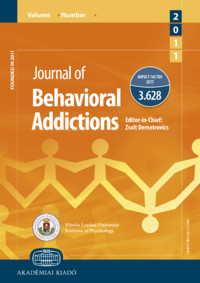Heart rate variability and interoceptive accuracy predict impaired decision-making in Gambling Disorder
Heart rate variability and interoceptive accuracy predict impaired decision-making in Gambling Disorder
Author(s): Lorenzo Moccia, Maria Quintigliano, Delfina Janiri, Valentina De Martin, Guyonne Rogier, Gabriele Sani, Luigi Janiri, Patrizia Velotti, Vittorio Gallese, Anna Maria Speranza, Marco Di NicolaSubject(s): Behaviorism
Published by: Akadémiai Kiadó
Keywords: interoception; somatic marker; autonomic nervous system
Summary/Abstract: Background and aims: Gambling Disorder (GD) entails maladaptive patterns of decision-making. Neurophysiological research points out the effect of parasympathetic arousal, including phasic changes in heart rate variability (HRV), and interoceptive accuracy (IA, i.e., the ability to track changes in bodily signals), on decision-making. Nevertheless, scarce evidence is available on their role in GD. This is the first study exploring the impact in GD of respiratory sinus arrhythmia (RSA), an index of HRV, and IA on decision-making, as measured by the Iowa Gambling Task (IGT). Methods: Twenty-two patients experiencing problems with slot-machines or video lottery terminals gambling and 22 gender- and age matched healthy controls (HC) were recruited. A resting ECG was performed before and after the completion of the IGT. IA was assessed throughout the heartbeat detection task. We conducted a MANCOVA to detect the presence of significant differences between groups in RSA reactivity and IA. A linear regression model was adopted to test the effect of factors of interest on IGT scores. Results: Patients with GD displayed significantly decreased RSA reactivity (P 5 0.002) and IA (P 5 0.024) compared to HCs, even after controlling for affective symptoms, age, smoking status, and BMI. According to the linear regression model, cardiac vagal reactivity and IA significantly predict decision-making impairments on the IGT (P 5 0.008; P 5 0.019). Discussion and conclusions: Although the exact pathways linking HRV and IA to impaired decision-making in GD remain to be identified, a broader exploration relying upon an embodiment-informed framework may contribute to shed further light on the clinical phenomenology of the disorder.
Journal: Journal of Behavioral Addictions
- Issue Year: 10/2021
- Issue No: 3
- Page Range: 701-710
- Page Count: 10
- Language: English

